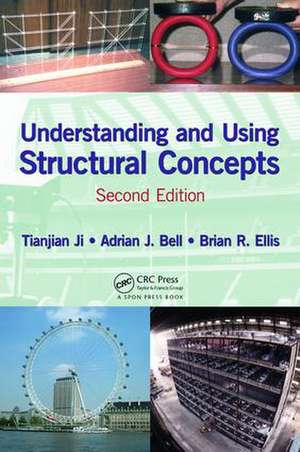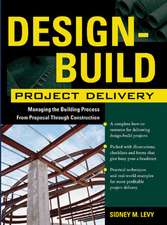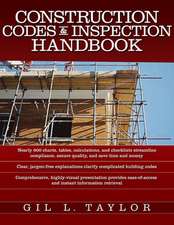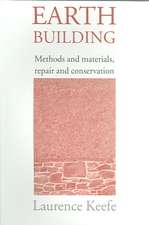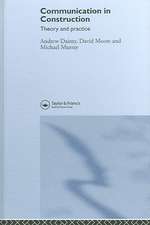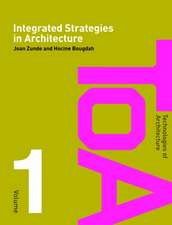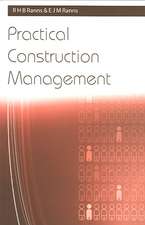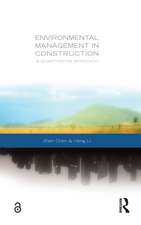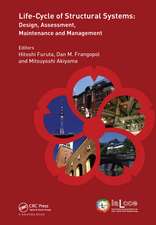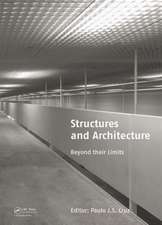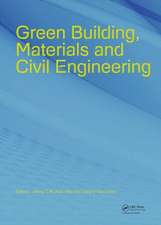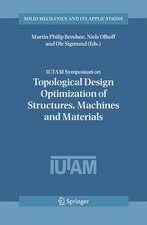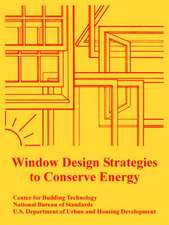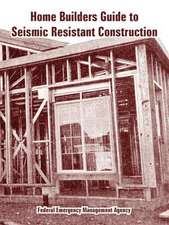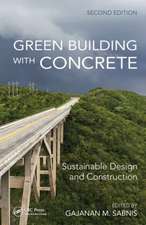Understanding and Using Structural Concepts
Autor Tianjian Ji, Adrian J. Bell, Brian R. Ellisen Limba Engleză Paperback – 22 dec 2015
This is achieved through:
- Connecting abstract theory with visual and practical examples
- Providing simple illustrative demonstration models, which can be used in conventional class teaching, to capture the essence of the concepts
- Including associated engineering examples, which demonstrate the application of the concepts and help to bridge the gap between theory and practice
- Incorporating the development of teaching material and innovative examples relating to structural concepts based on current research work
Preț: 419.84 lei
Preț vechi: 535.25 lei
-22% Nou
Puncte Express: 630
Preț estimativ în valută:
80.34€ • 85.91$ • 66.98£
80.34€ • 85.91$ • 66.98£
Carte tipărită la comandă
Livrare economică 18 aprilie-02 mai
Preluare comenzi: 021 569.72.76
Specificații
ISBN-13: 9781498707299
ISBN-10: 1498707297
Pagini: 394
Ilustrații: 555 black & white illustrations, 42 black & white tables
Dimensiuni: 210 x 280 x 23 mm
Greutate: 0.95 kg
Ediția:Revised
Editura: CRC Press
Colecția CRC Press
ISBN-10: 1498707297
Pagini: 394
Ilustrații: 555 black & white illustrations, 42 black & white tables
Dimensiuni: 210 x 280 x 23 mm
Greutate: 0.95 kg
Ediția:Revised
Editura: CRC Press
Colecția CRC Press
Cuprins
Overview of Structural Concepts. STATICS. Equilibrium. Centre of Mass. Effect of Different Cross Sections. Stress Distribution. Bending. Shear and Torsion. Span and Deflection. Direct Force Paths. Smaller Internal Forces. Buckling. Prestress. Horizontal Movements of Structures Induced by Vertical Loads. DYNAMICS. Energy Exchange. Pendulums. Free Vibration. Resonance. Damping in Structures. Vibration Reduction. Human Body Models in Structural Vibration. SYNTHESIS. Static and Modal Stiffnesses. Static and Dynamic Problems. Experimental and Theoretical Studies. Theory and Practice.
Recenzii
"Tianjian Ji and his co-authors have assembled a wealth of models, practical and visual examples to illustrate structural concepts, many of which students find confusing. They show that many structural concepts can be understood in quite simple, physical terms, without recourse to mathematics. Their text offers a valuable and interesting supplement to the more analytical structures books with which many students will be familiar."
—Martin Williams, University of Oxford, UK
"… an excellent source for both undergraduate and postgraduate students on any engineering course. … of great value to researchers and practitioners involved with the analysis of structures. There is a very good coverage of the subject: as it covers both the statics and dynamics of structures. The book also brings together theoretical and experimental approaches in analyzing structures and how the gap between them may be bridged. This is quite unique in structural analysis books."
—Messaoud Saidani, Coventry University, UK
"This is an excellent book. The authors are well known for their use of physical models to demonstrate structural concepts and this book will make their ideas more widely available."
-- Peter Bullman in The Structural Engineer
—Martin Williams, University of Oxford, UK
"… an excellent source for both undergraduate and postgraduate students on any engineering course. … of great value to researchers and practitioners involved with the analysis of structures. There is a very good coverage of the subject: as it covers both the statics and dynamics of structures. The book also brings together theoretical and experimental approaches in analyzing structures and how the gap between them may be bridged. This is quite unique in structural analysis books."
—Messaoud Saidani, Coventry University, UK
"This is an excellent book. The authors are well known for their use of physical models to demonstrate structural concepts and this book will make their ideas more widely available."
-- Peter Bullman in The Structural Engineer
Notă biografică
Tianjian Ji, MSc, PhD, CEng, FIStructE, is a senior lecturer at the University of Manchester. He worked on the design of structures and on structural investigation with consultants, China Academy of Building Research and Building Research Establishment Ltd., UK, for over 10 years before joining Manchester University in 1996. He has taught courses in structural analysis and structural design at all levels and has carried out research into structural dynamics and structural concepts. Together with Adrian Bell, he received the award for Excellence in Structural Engineering Education from the Institution of Structural Engineers, UK, in 2014. Adrian Bell , BEng, MSc, PhD, is a senior lecturer at the University of Manchester. He has worked with consultants on the design of a wide range of structures including long-span roofs and tower structures. He has taught courses in structural analysis and structural design at all levels for over 30 years and has carried out research into cable, steel and masonry structures. Together with Tianjian Ji, he received the award for Excellence in Structural Engineering Education from the Institution of Structural Engineers, UK, in 2014.Brian Ellis , BSc, PhD, DSc, CEng, MIStructE, was a technical director at the Building Research Establishment Ltd., UK. He worked at the Building Research Establishment for most of his career, where he undertook a wide range of work primarily related to structural dynamics. A significant part of the work involved testing and monitoring various structures in situ. He was also involved in work on national and international standards. Following his retirement, he has undertaken a limited amount of consultancy work.
Descriere
This book focuses on the understanding and use of structural concepts, with numerous demonstrations using physical models and practical examples. It connects abstract theory and demonstrates the application of the concepts. This new edition considers the relationships between static and dynamic problems, experimental and theoretical studies, and theory and practice. It suits a range of students in civil and structural engineering, including graduates as well as the more technically-minded architecture students and practicing engineers.
